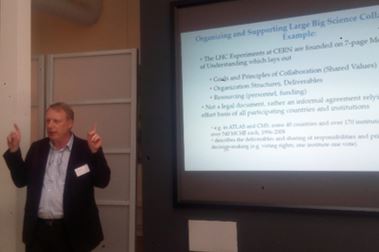Big Science workshop in Brussels

Photos: left, Leonardo Biagioni; right, Hans Priem
On June 8, 2017 the one-day workshop “Connecting Strength of Big Science” was organised by the Dutch ILO network in Brussels. The main topics of the event were questions like “How can scientific excellence be improved by long-lasting (international) cooperation between industry and the scientific world”.
Leonardo Biagioni, Head of Procurement from Fusion 4 Energy, gave the first presentation. He addressed issues like the evolution of Big Science, its relevance for industry and society and the potential of the synergy between Big Science programmes: why old paradigms in this field are no longer valid. The need for improved collaborations, shared technologies and synergies on a global scale.
The second speaker was Hans Priem representing the Dutch company VDL. He has given the industrial approach in relation to Big Science and he posed questions like, “What are the major considerations from industry to actively participate in Big Science projects? How to find the balance between acquisition and investments on the one hand and on the other hand the expected revenues in the long run.”
The third presentation was by Katinka Stenbjørn from the Danish Agency for Science and Higher Education. She explained why all participants should go to BSBF2018, the Big Science Business Forum to be held next February in Copenhagen. Katinka introduced the initiative that brings together Europe’s Big Science organisations and establishes the first one-stop-shop for companies and other stakeholders interested in engaging with the Big Science market.
Photos: left, Katinka Stenbjoern; right Michael Wise.
The next speaker was Michael Wise. He is Head of the Astronomy Group at ASTRON and an adjunct professor in Radio Astronomy at the University of Amsterdam. Michael discussed SKA as an example of a Big Science project, pros and cons of a decentralised model and how to optimally organise large infrastructures, and lessons learned from the development of SKA.
The last speaker was Markus Nordberg from CERN. He discussed how to organise and support large collaborations in Big Science endeavours during many years, maintaining the innovation chain, and assuring spin-off and technology transfer along the way.
Photo: Markus Nordberg
After the plenary sessions, the audience discussed in four parallel groups a number of important issues, which, during the final plenary session, resulted in recommendations like:
- Big Science is the cornerstone of scientific and economic development
- The cooperation between industry and Big Science could be improved by organising a Europe-wide ILO network
- A great place to have industry discussions with the Big Science infrastructures is at BSBF, the Big Science Business Forum, to be held for the first time in Copenhagen, February 26-28, 2018
- Industries can perform better if they start preparations for participation in Big Science tender actions very early in the tender process.
- Especially small companies and companies from smaller, Northern countries could rely more on the cooperation spirit of Big Sciences and should not hesitate too much in bidding on challenging risky tender actions.






 is funded by the European Union Framework Programme for Research and Innovation Horizon 2020, under grant agreement 676548.
is funded by the European Union Framework Programme for Research and Innovation Horizon 2020, under grant agreement 676548.